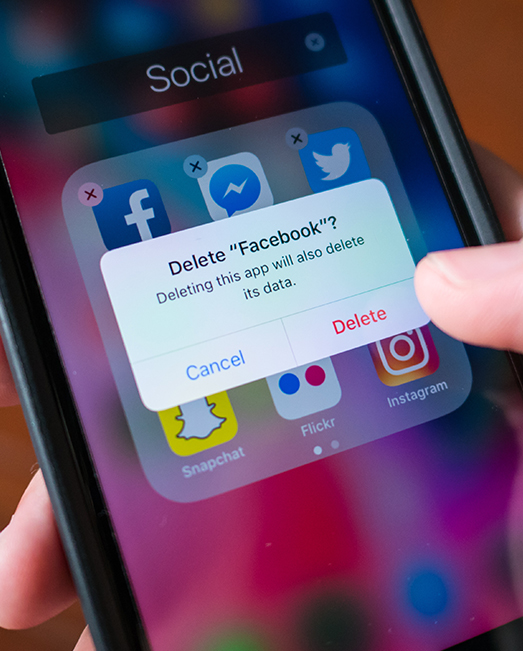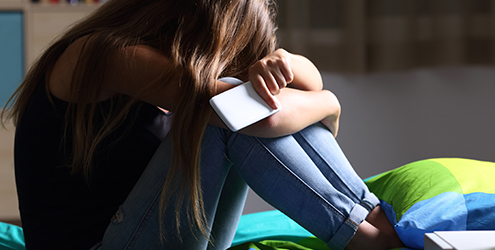Lifestyle
Copyright@ Australian Catholic University 1998-2026 | ABN 15 050 192 660 CRICOS registered provider: 00004G | PRV12008
Copyright@ Australian Catholic University 1998-2026 | ABN 15 050 192 660 CRICOS registered provider: 00004G | PRV12008

Ever tried a Facebook detox? New research shows you’ll probably be less stressed — but the hiatus may have some surprising effects on your wellbeing.
It’s 7am and the alarm on your smartphone is buzzing. You slowly pick it up, unlock the screen, tap the Facebook icon and spend a few idle minutes scrolling through your news feed. And if you’re like most people, this repeated browsing of social networking sites — sometimes passive, sometimes active — will happen several times throughout the day. At the bus stop, on the loo, in the lift, waiting for the barista to serve up your flat white …
The pervasiveness of social media has led many of us to try digital detoxing. Tech giant Apple has developed a tool to help wean people off their devices. And even Facebook’s own researchers have admitted that the mindless scrolling of social media can make people feel bad.
But what effect does Facebook have on our mental health? And do digital detoxes really work?
Stephanie Tobin from ACU’s School of Psychology recently teamed up with Eric Vanman and Rosemary Baker from the University of Queensland to test the effects a Facebook detox would have on stress and wellbeing.
The idea for the study, which was published in the Journal of Social Psychology, came from Dr Vanman’s own experience of temporarily deleting his Facebook account.
“When I told colleagues about my ‘Facebook vacations’, I found I wasn’t alone,” he said.
Vanman, Baker and Tobin’s study, titled “The Burden of Online Friends”, involved 138 active Facebook users, with 60 participants running the gauntlet of “No Facebook” for five days, and the rest continuing as “Facebook Normal”.
The participants had saliva samples taken before and after the test period to measure the stress indicator, cortisol, and were also asked a series of questions on perceived stress and wellbeing.
“The main finding was that those who did not use Facebook in the five-day period had a lower level of the stress hormone cortisol, which signals a benefit to taking a break from Facebook,” Dr Tobin said.
However, despite the reduction in physiological stress in the No Facebook group, perceived stress did not change — or as Dr Vanman put it, “they weren’t aware their stress had gone down”.
And perhaps most surprisingly, the reduction in stress came with a catch, with participants also reporting lower levels of wellbeing during their five-day detox.
“Many of the No Facebook group were happy to return to Facebook after the break,” Dr Tobin said. “They felt socially disconnected because they were effectively cut off from their network for those five days.”

Vanman, Baker and Tobin’s study shows there may indeed be merit in switching off from Facebook for less than a week. The sheer volume of information on the platform can be a lot to process, which many users find emotionally taxing.
“When you're on Facebook on a regular basis, there is a huge amount of social information coming through from a wide range of people, it’s a lot to keep up with and that can definitely be stressful,” Dr Tobin said.
This, argues Dr Vanman, could mean that cycling between periods of active use and detoxing could be beneficial.
“It seems that people take a break because they’re too stressed, but return to Facebook whenever they feel unhappy because they have been cut off from their friends,” he said.
“It then becomes stressful again after a while, so they take another break. And so on.”
However, while there may be value in disconnecting in order to clear your mind of clutter, not all people use Facebook in the same way. And Dr Tobin suggests that user habits are crucial to determining an individual’s experience on the platform.
“When you look at the literature, it’s often the passive users of Facebook who experience the negative effects on wellbeing, those who don’t post or engage very much but just scroll through and consume content from others,” she said.
So in general, the more you interact with others on Facebook — your close friends, acquaintances and like-minded users — the more positive your experience.
“Those who use Facebook to stay connected, who engage in active use, tend to experience the more positive outcomes, such as increased wellbeing and greater connectedness,” Dr Tobin said.
In 2014, Australian comedian Andrew Denton launched a one-man campaign against excessive social media use, inviting readers to join him in shunning the world of Facebook and Twitter.
“This is JOMO — Joy of Missing Out — a cheerful disengagement from the twin universes of Facebook and Twitter; one that gives me active pleasure in not minding that I haven't seen, or been seen to respond, to the latest post, meme or snark,” Denton wrote.
“Step away from the device. You are not an algorithm. You are you. If you are willing to assert yourself over a desire to please strangers, you'll be amazed at the great, liberating joy to be had in missing out.”
JOMO is, of course, a reaction to FOMO, the Fear of Missing Out, defined by one 2013 study as “a pervasive apprehension that others might be having rewarding experiences from which one is absent … characterised by the desire to stay continually connected with what others are doing.”
This may partially explain what those in the No Facebook group in Vanman, Baker and Tobin’s study were experiencing during their five-day Facebook hiatus.
“I don’t think it’s as simple as saying, ‘well, you should never use Facebook’ — it's much more complex than that,” Dr Tobin said.
“Our study showed both positive and negative outcomes. Yes, being on Facebook all the time may be stressful, but you may also feel less life satisfaction if you cut yourself off, especially if your whole social network is carrying on without you … and you would imagine that the longer you’re off it, the more you’d miss out on.”
Dr Tobin and her colleagues said more research was needed to investigate the effects on stress levels during a longer break from Facebook. She is also investigating the effects that the goals and motivations of social media users have on their individual experiences.
Dr Stephanie Tobin is a senior lecturer in ACU’s School of Psychology. Her research examines the psychology of social media use, including social media addiction and activities that promote and threaten belonging and wellbeing.

Copyright@ Australian Catholic University 1998-2026 | ABN 15 050 192 660 CRICOS registered provider: 00004G | PRV12008